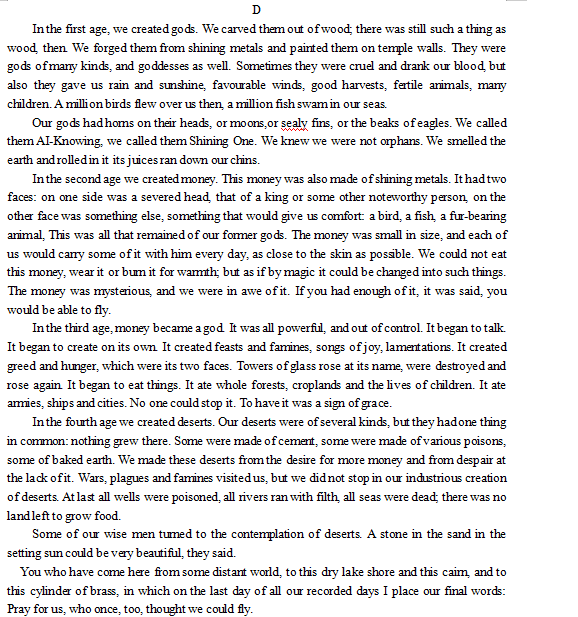事考帮APP
让考事变得更简单










请使用微信扫描二维码,登录事考帮
 成功弹窗点击
成功弹窗点击
 失败弹窗点击
失败弹窗点击
 警告弹窗点击
警告弹窗点击
 提示弹窗点击
提示弹窗点击
D
In the first age, we created gods. We carved them out of wood; there was still such a thing as wood, then. We forged them from shining metals and painted them on temple walls. They were gods of many kinds, and goddesses as well. Sometimes they were cruel and drank our blood, but also they gave us rain and sunshine, favourable winds, good harvests, fertile animals, many children. A million birds flew over us then, a million fish swam in our seas.
Our gods had horns on their heads, or moons,or sealy fins, or the beaks of eagles. We called them AI-Knowing, we called them Shining One. We knew we were not orphans. We smelled the earth and rolled in it its juices ran down our chins.
In the second age we created money. This money was also made of shining metals. It had two faces: on one side was a severed head, that of a king or some other noteworthy person, on the other face was something else, something that would give us comfort: a bird, a fish, a fur-bearing animal, This was all that remained of our former gods. The money was small in size, and each of us would carry some of it with him every day, as close to the skin as possible. We could not eat this money, wear it or burn it for warmth; but as if by magic it could be changed into such things. The money was mysterious, and we were in awe of it. If you had enough of it, it was said, you would be able to fly.
In the third age, money became a god. It was all powerful, and out of control. It began to talk. It began to create on its own. It created feasts and famines, songs of joy, lamentations. It created greed and hunger, which were its two faces. Towers of glass rose at its name, were destroyed and rose again. It began to eat things. It ate whole forests, croplands and the lives of children. It ate armies, ships and cities. No one could stop it. To have it was a sign of grace.
In the fourth age we created deserts. Our deserts were of several kinds, but they had one thing in common: nothing grew there. Some were made of cement, some were made of various poisons, some of baked earth. We made these deserts from the desire for more money and from despair at the lack of it. Wars, plagues and famines visited us, but we did not stop in our industrious creation of deserts. At last all wells were poisoned, all rivers ran with filth, all seas were dead; there was no land left to grow food.
Some of our wise men turned to the contemplation of deserts. A stone in the sand in the setting sun could be very beautiful, they said.
You who have come here from some distant world, to this dry lake shore and this cairn, and to this cylinder of brass, in which on the last day of all our recorded days I place our final words: Pray for us, who once, too, thought we could fly.

A
Gods always bless human beings.
B
Gods are more often than not ferocious in the age of metals.
C
Gods are created, carved out of wood or metals.
D
Gods are symbols of human’s greed.
正确答案 :C
解析
正误判断题。文章首段第二、三句提到,我们用木头刻出神,后来又使用金属锻造,故C项“神是用木头或金属制造出来的”符合题意。故A项“神总是保佑人类”是片面的,原文首段第五句提到,神有时是残忍的,并且会喝我们的血,但下文提到神也会帮助人们。B项“在金属时代,神经常是残忍的”,选项中的more often than not 表示“往,通常”,与文中说的“有时(sometimes)”不一致。D项“神是人类贪婪的象征”,原文只是在第三个时代才提到“钱创造了贪婪和饥饿这两副面孔”。故本题答案为C。
相关试题
19. ________ both sides accept the agreement ________a lasting peace be established in this region.
41. Professor began to give high grades in the early 1970s because _____
27.
31.
25.
21.
5. Mainstream pro-market economists all agree that competition is an ______ spur to efficiency and innovation.
55. Which of the following statements about “deserts” is NOT true?
22
4.Unless we can draw out lessons for our own times, history becomes ______ a series of dry data points with no broader relevance.
16.Today, these methods are viewed as practices that can cause harm and are in the last -_______ only to be used when measures have failed and safety is at sever risk.
31.张老师认为教育就是为了要让学生学习知识,把握学习内容。张老师遵循的理论是( )。